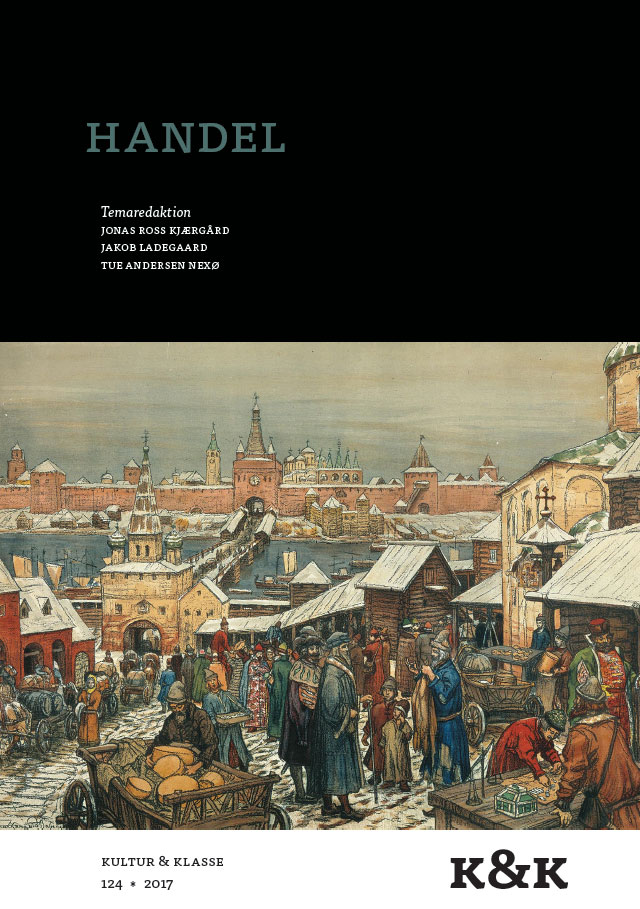Handelsorientalisme i engelsk drama 1580-1630
DOI:
https://doi.org/10.7146/kok.v45i124.103798Keywords:
Handel, orientalisme, merkantilisme, renegater, islam, markedsplads, pirater, jøder, konvertering, handelskompagni, det fælles bedste, tidlig moderne drama, tyrko-barbareskAbstract
The early modern Turco-Barbary plays of Christopher Marlowe, Robert Daborne and Philippe Massinger bear witness to how deeply England’s expanding trade with the Muslim Ottoman Empire affected English literature. Within few decades, a new catalogue of dramatis personae such as Turcs, Barbary pirates, English sailors who had converted into Islam, Jewish merchants and go-betweens, began to appear on the scenes of London’s commercial theatres. The purpose of this article is to discuss the particular mercantile character of this renaissance orientalism. Through the demonstration of how the theatrical representation of the encounter with the Muslim world was based on a moral suspiciousness or scepticism toward the merchant whose commerce depended upon foreign markets in goods and money, this article attempts to understand why conversion to Islam and cross-cultural movement becomes such a prominent feature in the English Turco-Barbary plays.
References
Davis, Robert C. Christian Slaves, Muslim Masters, White Slavery in the Mediterranean, the Barbary Coast, and Italy, 1500-1800. Hampshire and New York: Palgrave Macmillan, 2003.
Erikson, Emily og Valentina Assenova. “Introduction: New Forms of Organization and the Political and Commercial Actors”. Red. Emily Erikson. Chartering Capitalism: Organizing Markets, States, and Publics. UK: Emerald Group Publishing Limited, 2015. 1-15.
Finkelstein, Andrea Lynne. Harmony and Balance: An Intellectual History of Seventeenth Century English Economic Thought. USA: University of Michigan Press, 2000.
Forman, Valery. Tragicomic Redemptions: Global Economy and the Early Modern English Stage. Pennsylvania: University of Pennsylvania Press, 2013.
Games, Alison. The Web of Empire: English Cosmopolitans in an Age of Expansion, 1560-1660. Oxford: Oxford University Press, 2008.
Greenblatt, Stephen. "Marlowe, Marx, and Anti-Semitism”. Critical Inquiry 5 2 (1978): 291-307.
Kamen, Henry. The Iron Century: Social Change in Europe, 1550-1660. New York: Prager, 1971.
Levin, Richard. "The Contemporary Perception of Marlowe’s Tamburlaine”. Medieval & Renaissance Drama in England 10 (1998): 51-70.
Marlowe, Christopher. Jøden fra Malta. Loxodonta.dk 2016.
Marlowe, Christopher. Tamburlaine Den Store, del 1. Loxodonta.dk 2016.
Said, Edward. Orientalism. London: Penguin Books, 2003.
Thurn, David H. ”Economic and Ideological Exchange in Marlowe’s ”The Jew of Malta”. Theatre Journal 46 2 (1994): 157-170.
Vitkus, Daniel J. (red.). Three Turk Plays from Early Modern England:
Selimus, Christian Turned Turk, The Renegado. New York: Columbia University Press, 2000.
Vitkus, Daniel. ”Turning Turk in Othello: The Conversion and the Damnation of the Moor”. Shakespeare Quarterly 48 2 (1997): 145-176.
Downloads
Published
How to Cite
Issue
Section
License
Tidsskriftet følger dansk ophavsret.





